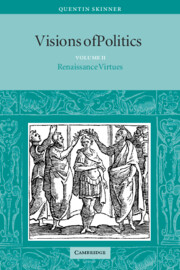Book contents
- Frontmatter
- Contents
- List of plates
- General preface
- Full contents: Volumes 1–3
- Acknowledgements
- Conventions
- 1 Introduction: The reality of the Renaissance
- 2 The rediscovery of republican values
- 3 Ambrogio Lorenzetti and the portrayal of virtuous government
- 4 Ambrogio Lorenzetti on the power and glory of republics
- 5 Republican virtues in an age of princes
- 6 Machiavelli on virtù and the maintenance of liberty
- 7 The idea of negative liberty: Machiavellian and modern perspectives
- 8 Thomas More's Utopia and the virtue of true nobility
- 9 Humanism, scholasticism and popular sovereignty
- 10 Moral ambiguity and the Renaissance art of eloquence
- 11 John Milton and the politics of slavery
- 12 Classical liberty, Renaissance translation and the English civil war
- 13 Augustan party politics and Renaissance constitutional thought
- 14 From the state of princes to the person of the state
- Bibliographies
- Index
- Plate section
7 - The idea of negative liberty: Machiavellian and modern perspectives
Published online by Cambridge University Press: 05 September 2012
- Frontmatter
- Contents
- List of plates
- General preface
- Full contents: Volumes 1–3
- Acknowledgements
- Conventions
- 1 Introduction: The reality of the Renaissance
- 2 The rediscovery of republican values
- 3 Ambrogio Lorenzetti and the portrayal of virtuous government
- 4 Ambrogio Lorenzetti on the power and glory of republics
- 5 Republican virtues in an age of princes
- 6 Machiavelli on virtù and the maintenance of liberty
- 7 The idea of negative liberty: Machiavellian and modern perspectives
- 8 Thomas More's Utopia and the virtue of true nobility
- 9 Humanism, scholasticism and popular sovereignty
- 10 Moral ambiguity and the Renaissance art of eloquence
- 11 John Milton and the politics of slavery
- 12 Classical liberty, Renaissance translation and the English civil war
- 13 Augustan party politics and Renaissance constitutional thought
- 14 From the state of princes to the person of the state
- Bibliographies
- Index
- Plate section
Summary
My aim is to explore a possible means of enlarging our present understanding of the concepts we employ in social and political argument. Aprevailing orthodoxy bids us proceed by consulting our intuitions about what can and cannot be coherently said and done with the terms we generally use to express the concepts involved. But this approach might with profit be supplemented, I shall argue, if we were to confront these intuitions with a more systematic examination of the unfamiliar theories within which even our most familiar concepts have sometimes been put to work at different historical periods.
One way of proceeding with this line of thought would be to offer a general defence of this view about the ‘relevance’ of the history of philosophy for the understanding of contemporary philosophical debates. But I shall instead attempt to follow a more direct, if more modest, route by focusing on one particular concept which is at once central to current disputes in social and political theory and is at the same time overdue, it seems to me, for this type of historical treatment.
The concept I have in mind is that of political liberty, the extent of the freedom or liberty of action available to individuals within the confines imposed on them by their membership of civil associations. The first point to be observed is that, among Anglophone philosophers of the present generation, the discussion of this topic has given rise to one conclusion which commands a remarkably wide measure of assent.
- Type
- Chapter
- Information
- Visions of Politics , pp. 186 - 212Publisher: Cambridge University PressPrint publication year: 2002
- 8
- Cited by

